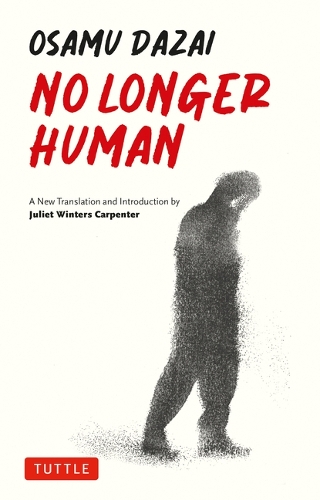
No Longer Human
(Paperback)
Available Formats
Publishing Details
No Longer Human
By (Author) Osamu Dazai
Translated by Juliet Winters Carpenter
Tuttle Publishing
Tuttle Publishing
5th March 2024
8th March 2024
United States
Classifications
Physical Properties
Paperback
160
Width 130mm, Height 203mm
198g
Description
'Dazai's brand of egoistic pessimism dovetails organically with the emo chic of this cultural moment and with the inner lives of teenagers of all eras.' Andrew Martin, The New York Times
'A journey to hell with Osamu Dazai, Japan's ultimate bad boy novelist' Damian Flanagan, The Japan Times
No Longer Human is the story of Yozo Oba, who, from early childhood, finds it impossible to form meaningful relationships with family or friends. As a child he copes by acting the fool mocking himself while entertaining others; as an adult he turns to alcohol, sex and drugs, which lead to his eventual self-destruction.
In this novel, based closely on his own life, Dazai skillfully leads the reader to sympathize deeply with Oba. Although the book was published in 1948, the timeless and universal themes of social alienation, failure, and one man's inner torture at his inability to feel like a normal human still resonate with young people everywhere, making an enduring classic.
After Soseki Natsume, Osamu Dazai (19091948) is Japan's most famous writer. Dazai is enjoying a surge in popularity among young people today thanks to the success of the recent manga, anime and film series Bungo Stray Dogs, whose protagonist, a detective named Osamu Dazai, is based on the real-life author.
Reviews
"Today, such a writer might be castigated, condemnedN and turned into an instant pariah: Perhaps his books would be taken from bookshops. Yet when Osamu Dazai's short, electrifying novel, "Ningen Shikkaku" (No Longer Human) was published in 1948, it triggered a huge "Dazai Boom."" --Damian Flanagan, The Japan Times: "A journey to hell with Osamu Dazai, Japan's ultimate bad boy novelist"
"Dazai's brand of egoistic pessimism dovetails organically with the emo chic of this cultural momentand with the inner lives of teenagers of all eras." -- Andrew Martin, The New York Times
Author Bio
Osamu Dazai (1909 - 1948) was the pen name of Shuji Tsushima, the tenth of eleven children born to a wealthy landowner and politician in the far north of Japan. Dazai studied French literature at the University of Tokyo, but never received a degree. He first attracted attention in 1933 when magazines began to publish his work. Between 1930 and 1937, he made three suicide attempts, a subject he deals with in many of his short stories. Despite his troubled life and rebellious spirit, Dazai wrote in simple and colloquial style, conveying his personal torments through literature. Dazai's life ended early in a double suicide with a married lover.
Juliet Winters Carpenter is an American translator of modern Japanese literature. She studied Japanese literature at the University of Michigan and the Inter-University Center for Japanese Language Studies in Tokyo. After completing her studies, she returned to Japan where she became involved in translation and teaching. She is professor emeritus at Doshisha Women's College of Liberal Arts in Kyoto and has received numerous awards for her translation work including the 2019 - 2020 William F. Sibley Memorial Award for Japanese Translation for Mizumura Minae's An I-Novel and the 2021 - 2022 Lindsey and Masao Miyoshi Translation Prize for a lifetime of achievement as a translator of modern Japanese literature.
